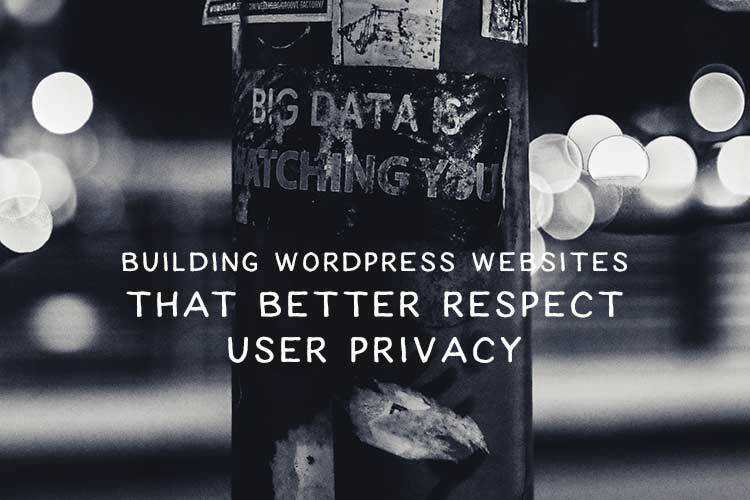As technology continues to rise, security concerns are rising too. Privacy is considered one of the main aspects of being online. This is because many services sell your data. Even Facebook failed to fend off the user data breach lawsuit. Therefore, security and WordPress privacy is one of the biggest concerns of our modern-day society.
However, the world seems to be confused, even to this date. Hence, it’s important to make websites that respect user’s privacy. We visit a lot of websites daily. These websites ask us for our information. However, do you know if they’re selling your data or not?
This is why web designers and developers are stuck somewhere in-between. They are confused. To make things worse, we rely on third-party apps and plugins. And these apps might be stealing your data. This is why it’s technical to make websites considering WordPress privacy. However, it’s not like the CMS does not take your privacy seriously. It’s a fact that it does.
Even so, there are factors that can give you WordPress privacy and security issue. Let’s talk about some common WordPress privacy and security issues.
Common WordPress Privacy Issues
A lot of people ask this question, “Is WordPress Privacy strong?” The answer is that it depends. In my opinion, if you all the rules and regulations of WordPress, there will be no issue. 34% of the world’s websites run on WordPress. Does it mean that it’s secure? No! Again, it depends.
There can be a lot of vulnerabilities still. So what should you do? Should you just disable cookies, themes, and ads? That’s wrong because these things are essential for the website. These are one of the most common WordPress Privacy and Security Issues.
1. Malware

Malware is a piece of code that can gain authorization to sensitive data of your website. This happens if you’ve got a vulnerable website. Therefore, it means that your WordPress files have been injected with a virus that can mess up the system and gain inaccessible data.
There are thousands of malware viruses and WordPress is vulnerable to a couple of them. These malicious viruses can use your data and gather them to use for any purpose it likes. Moreover, data is the most important asset for any business.
But here’s the good news, each type of a malicious virus can be identified and easily removed manually too. Moreover, this is why there are backups. You can always use backups to restore it at a safe point.
2. SQL Injections

You probably know that the database, where all of your data is stored, in WordPress, MySQL database is used. The main and simplest concept of SQL injection is that it occurs when someone has the password of your WordPress and now he can gain access to the data.
With this injection, the hacker can create an admin-level account to have full access to your WordPress site. This is another dangerous scenario. Moreover, these SQL injections are also used to add some sneaky links of viruses on your website too. So be aware of that.
3. PHP Code

PHP code is one of the most common WordPress privacy issues. It can be exploited by hackers or thieves. WordPress works with PHP and all the plugins too. Therefore, if the code is affected, there can be a serious problem too.
Whenever a vulnerable piece of code is used to load remote files on the website, it gives the hacker a chance to exploit your website. Moreover, they can gain access to your website’s data too. They can access the “wp-config” file, which has a huge role in your WordPress website.
4. Brute Force Attacks

What is the Brute Force Attack? As the name says, Brute Force is just a way to trying again and again until the right password is discovered. It is one of the simplest ways to gain access to your website. However, it’s not all that impressive.
But here’s the tricky part. Brute Force Attacks can still mess up your website. Considering that multiple login attempts can have a bad impact on your server. This is more likely to happen if you’re on a shared hosting plan. Therefore, you can use some plugins like Jetpack to stop these attempts.
Now let’s talk about privacy in a general sense and how you can avoid this mess. To avoid your data get stolen and for better WordPress privacy, you should take these measures.
Disabling Everything
On the first thoughts, disabling everything seems like it’ll do the trick. Just ask yourself though. Can you make a website in 2019 without any plugins, themes, cookies and 3rd party service uses?
The client is not going to be happy about you or your work. That is what’s going to happen on the first thought. That is the reason why designers and developers must do their work while keeping in view the reality too. Also, there are lawyers and the team of professional legal persons involved too, that is if you want to get all the involved adherence verified.
However, the truth is that your data is always going to be taken by one means or by another. Either it’ll be taken directly from your website or from some outside service that you’re probably connected to. But! That doesn’t mean that we should stop making awesome websites. We should just sit down for a moment, with proper sound planning and talk with our clients. We should make some decisions to keep moving forward. A little compromise and the use of the brain will probably do the trick.
Plugins

For plugins, we see that they always try to make more and more of our information. Even if they want data for some obvious reasons, we should not just believe it. We don’t know what plugin will send what data to a 3rd party. These plugins will probably look for anonymous data such as the other plugins that you’re using or your hosting plan.
Even so, being careful is the way to go. You should probably find some other plugins in that case. WordPress is super flexible and it provides many options. Therefore, there are limitless amounts of plugins available for it.
Themes

Themes are the basic building block of a website. We all use themes to make our websites look good or even fast sometimes. However, some themes send data back to the developers. Normally, you do have an option to turn it off in settings.
However, it’s best to be careful about any policy that these companies have. Therefore, it’s always better to think before you act. That’s how things are supposed to be.
Moreover, you can use custom theme builders to even use your theme that you can make with coding to avoid this mess. There are many pre-built frameworks that you can use to customize your own. It’s not for everyone but coding and web enthusiast, you guys know what I’m talking about.
Third-Party
One of the biggest threats is, of course, the third-party. Some of the third party services and like Google fonts and others. They do track your data one way or another thought. Therefore, this can mean your WordPress Privacy going down.
Moreover, you should be careful in using any third-party services. We don’t know how some social media like Facebook or Twitter are going to track our data and make use of it. You should always read policies and documentation to make yourself sure and straight that your data isn’t going to be used for anything that you might not need.
The Fix?
Concluding is hard. Web developers and Web designers are in a tough spot. Making a website that respects WordPress Privacy and the client’s privacy, it’s pretty hard. Coupled with the government laws and policies of the service providers, it seems like an impossible mission for designers.
We don’t know how Facebook collects our data or how twitter or Instagram does. Moreover, the whole system of this advertising media is tough. Therefore, designers do need to encourage their clients to set their privacy policies. This should be done, keeping in view that legal professionals and lawyers are a must to resolve this issue.
If we compare the current design of websites to some decades ago, it requires a lot more focus and changes. Nowadays it’s hard to cope up with everyone’s demand. You need to add some advanced functionalities and cope up with all the client’s demands too.
To make all things work, it’s best to take everything step by step. Make sure to use themes that will not sell your data to anyone. Always use better plugins that have minimal risk of data supply. Always be careful in using the 3rd party services. This whole method isn’t perfect for respecting WordPress privacy. However, we should still try what we are doing.




